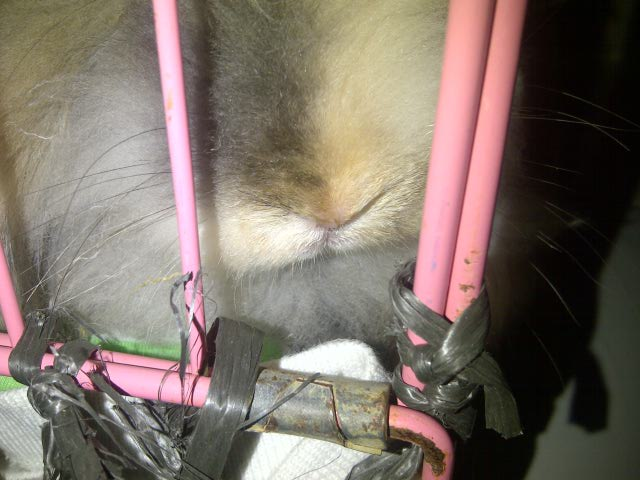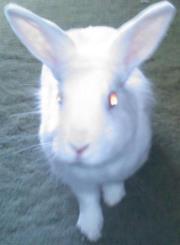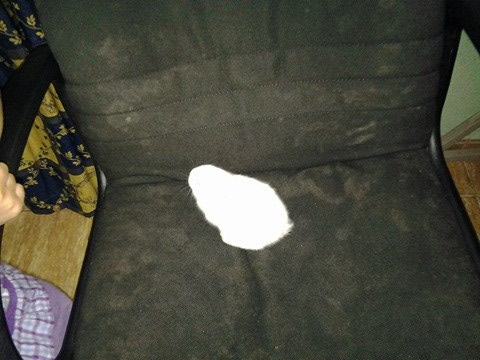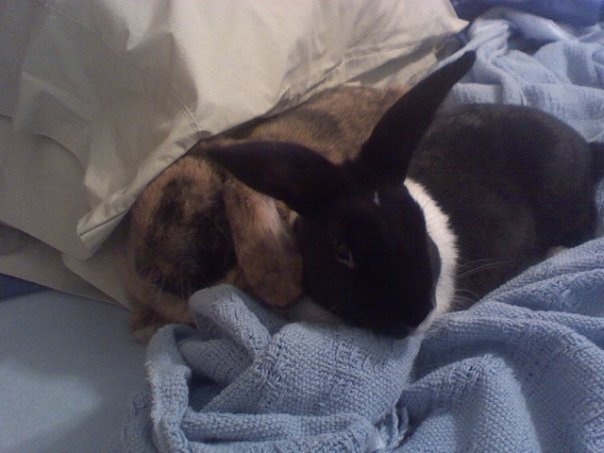QuestionQUESTION: Hi Alice,
I have a domestic rabbit named Hershey, about 8 years old. In the last 8 years he has been extremely healthy. About 3 weeks ago, we noticed some discharge coming from his eyes. I immediately tried finding a vet that would look at him. No luck in our city. One vet just outside of town, who cannot take any new patients, recommended that I purchase Polysporin Ophthalmic Eye and Ear drops and try that. The next day we noticed that Hershey's right ear was drooping and swollen and red. I again made some calls, and was able to find a vet in Alexandria, ON.
She looked at Hershey, indicating she had done some work with Exotic pets, and indicated that he had a bad ear infection. She recommended some eye ointment, ear drops ( enrofloxacin) and some oral medication. We did this according to her instructions for 7 days. No change. In fact he now had a head tilt, and no balance. We brought him back. She said she had done all she could, and that we could see a specialist in Ottawa, or that she could put him down for us. Putting him down is not an option. Seeing a specialist, I cannot afford. So we brought him home, and I decided to finish using the ear drops. He is still eating and drinking, although not as much as he used to. When we put him outside for short periods in his outside cage he is very relaxed. We bring him inside after a short while, clean his indoor cage frequently, and I even put in some towels for cushioning because he rolls over when losing his balance. Is there anything holistically speaking that we can do to help this ear infection? Would an application of mineral oil, or a 50/50 solution of peroxide and water flushed in his ear help?
Give me your thoughts. We don't want to lose Hershey.
Thank you,
ANSWER: Hi Lisa
I am so sorry to hear about Hershey. That being said, it does sound like an inner ear infection and sometimes the first type of antibiotic doesn't work, but there are over 25 different antibiotics that they could have tried. Baytril is one that is commonly used but is not always effective at getting it treated the first time around.
I find it hard to believe that after only one antibiotic course she gave up and said she did all she could do.
Not only am I surprised that she prescribed ear drops but that she didn't give him any oral antibiotics or injectable... they are more effective.
Sometimes some of the vets who accept rabbits in emergencies, they don't typically treat rabbits otherwise and they treat them as though they were treating a cat or dog and will prescribe the same courses of treatment which can either be deadly or completely ineffective in rabbits.
There are listings for qualified vets who work with rabbits regularly at www.rabbit.org I suggest finding one even in the next town if you are able.
An ear infection left untreated causes head tilt, so it doesn't surprise me that it has progressed to this point. An inner ear infection left untreated can also eventually affect his brain since they are inter-connected. Get a second opinion, he really does need the treatment and a qualified and trusted vet will be able to fix this for you with the right treatment.
Another thing to check Hershey for is any bug bites in or around his ears. Look in both ears. Is the wax built up, do they look clean? Feel him over for any abscesses or bug bites. Sometimes parasites can burrow into the skin or ears and cause similar symptoms but a different course of treatment is necessary. Again, left untreated, it would interrupt the central nervous system causing paralysis and eventually death.
Let me know how it goes and if you need any further assistance feel free to contact me.
Alice
---------- FOLLOW-UP ----------
QUESTION: Hi Alice,
Thank you for your advice. I too was surprised when the vet said there was nothing more she could do. I did ask her if a second round of the antibiotics was needed, and she felt the way he reacted to the first round, almost seemed like an auto-immune disorder. I now have the paper in front of me listing the medication she put him on intially. Perhaps this will shed some light on our problem. She gave him Surolan ear and skin solution drops, once a day for 7 days, BNP Ointment 3.5 g, 3 - 4 times a day for 7 days, and I apologize, yes she did give him Baytril, 150 mg with Grenadine , 1 ml orally once a day, which lasted the 7 days. We did not see an improvement, and like I said by the time I brought him back he had no balance. Do you think it is worthwhile going back to her and asking for another round of antibiotics? The first round with office exam was about $ 127.00. She didn't charge me for the second appointment, because she felt she couldn't do anything.
Thanks,
Lisa
AnswerHi Lisa
I just noticed now that you are from Ontario... where about... Maybe I can recommend a vet as I am also in Ontario.
Baytril commonly doesn't work. There are injectable antibiotics that can be given and are highly recommended if oral anti-biotic aren't responding. Did his ear have any pus... did the vet do a culture of the pus to see which anti-biotic responds best... If not, then you will put Hershey in the safe hands of someone who knows how to treat bunnies to give him the best shot possible.
Not only might it be something other than an ear infection like pasturella. You did mention that his eyes were goopy which would lead me to believe he had a cold in the first place.
I wouldn't put anything in his ear like mineral oil because if it doesn't help, it could exacerbate the condition. Water in the ears is a big cause of ear infections in rabbits.
The head tilt will commonly throw off a rabbits balance as will an ear infection.
If he were my rabbit, I would take him to a rabbit vet who you trust. If you did trust her, you wouldn't be online questioning her decision. You would feel confident in her treatment.
I had a rabbit who had head tilt and luckily with one course of anti-biotic he came out the other side fine. I was even able to pick up the treatment even without an office exam as this but this was many years ago. There are more treatment options even then there were back then.
Here is an article on head tilt. They are suggesting that rabbits even with no balance, who have head tilt, that they can still lead a quality life under certain circumstances.
http://www.bio.miami.edu/hare/tilt.html
Ear Infection Of the causes listed, we have found that by far the most common is a middle- or inner ear infection. The Vestibular Apparatus, largely responsible for the sense of balance, is located in the bulla of the skull, a large, hollow space near the base of each ear. An ear infection can cause the tissues of the ear and inside the bulla to become inflamed, and this can interfere with proper function of the Vestibular Apparatus. A very severe inner ear infection can actually cause the bulla to fill with hard, caseous (i.e., of a tough, cheeselike texture) pus. This presses on the Vestibular Apparatus, and prevents its proper function. Any inflammation of the VA can cause head tilt.
Under the best circumstances, pus is visible inside the ear, and the vet can take a sample for culture and sensitivity testing. This will reveal (1) the species of bacteria most likely responsible for the infection and (2) the types of antibiotics most likely to kill that species/strain of bacteria. Although the most common pathogens we have seen associated with head tilt are Pseudomonas aeruginosa and Pasteurella multocida, but there are many others which also can cause this problem. Each species/strain of bacteria has its own specific sensitivity and resistance to various antibiotics. Before you throw good money after bad in a "guess" at an effective antibiotic (some vets will automatically prescribe Baytril, since it's safe--but it may not be effective against the bacteria causing the problem!), it's really best to invest in For a culture and sensitivity test if there is pus inside the ear to culture.
Once the results of the culture and sensitivity test are back, don't be surprised if your vet tries a combination of two different antibiotics to kill the bacteria. Many experienced rabbit veterinarians are now finding that combining two antibiotics is more effective at killing some of the more resistant bacteria found in rabbit ear infections. It is especially important that your veterinarian be familiar with the specific needs of rabbits in terms of antibiotics, since some of these drugs (e.g., any oral penicillins such as amoxycillin or ampicillin, and any lincosamine antibiotics) can be deadly to rabbits, even if they are commonly used on other species.
Whatever the prescription, it is vitally important that you continue to give the rabbit the full dose for the full time span your vet has indicated. Stopping the antibiotic therapy before the infection is fully gone can simply promote the selection of a resistant strain of bacteria, since those are the last ones to die off when exposed to antibiotics. If you stop the antibiotics too soon, only the most resistant ones will be left to reproduce and repopulate your poor bunny's ear!
In some cases, an ear infection appears highly resistant to the most commonly used antibiotics. A relatively recently "rediscovered" therapy that has proven highly effective in cases of head tilt, jaw abscesses and other infections of the head is treatment with bicillin, a rabbit-safe combination of injectible Penicillin-G Procaine and Benzathine. This has been used on rabbits who were deemed terminal and untreatable, and produced miraculous cures. It is something to consider if conventional antibiotic therapies are not effective.
While the antibiotics are doing their work, your vet might also prescribe other drugs to help restore balance and control the discomfort associated with vertigo. Meclizine (commercially known as Anti-Vert) is excellent for controlling dizziness, though it will not work for every rabbit. If meclizine does not control the nystagmus, your vet might prescribe a course of short-acting corticosteroids to reduce the inflammation interfering with the vestibular apparatus. We have found that these drugs can sometimes help restore normal posture even before the infection is fully cured.
It can sometimes take weeks or even months to completely cure an inner/middle ear infection. This may sound like a long time, but if supportive care is offered, and the rabbit continues to eat and drink normally and is still interested in life, it means she's not ready to give up. The condition is disorienting, but does not seem to be painful. The illness is temporary, if hard to watch, but it's worth a course of supportive care to see your bunny happy and running around again.
The results of patient nursing a bunny through torticollis can be very rewarding. I have nursed three rabbits through head tilt. Slooby's head tilt appeared very suddenly. After only fourteen days on Baytril (enrofloxacin), he was completely cured, and has not had a recurrence.
The other two, Hamish and Jamie Blue, had severe head tilts when they came to us as rescues. Jamie Blue not only had severe nystagmus; she was so disoriented that she could not stand up. She spent most of the time rolling uncontrollably, and had to be placed in a padded pen so that she would not accidentally hurt herself. Meclizine and corticosteroids helped with the immediate symptoms, but it took eight months on antibiotics to completely clear her ears of the Pseudomonas aeruginosa (which happened to be resistant to all the antibiotics tested except ciprofloxacin and colymicin) that was causing the problem.
Hamish's head tilt was also due to Pseudomonas aeruginosa, but his strain was sensitive to Baytril and aminoglycosides (e.g., amikacin, gentocin). I mention this to illustrate that randomly selecting a common antibiotic that is "usually effective" against many strains of bacteria may be a waste of time and money. A culture and sensitivity test will usually end up paying for itself in terms of time and money saved on ineffective antibiotic treatments.
Acupuncture, chiropractic treatments and massage have helped immensely with both Jamie Blue's and Hamish's head tilts. But it seems that the single most important form of physical therapy--once they stopped rolling--was regular exercise in a spacious play area where they can run in wider and wider circles, working themselves up to straight lines. Jamie Blue and Hamish both emerged from their head-tilt ordeals as happy, frolicking bunnies with a slight, residual head tilts. But even the slight tilts improved with exercise and more massage. You might be interested in a simple, but effective form of physical therapy shared with us by Larry Gavlak, who helped his bunny (Boper) regain his balance with a technique used on humans who have lost their sense of balance.
The bottom line is this: treatment for head tilt caused by an ear infection is not only possible, but often very successful. It might take a lot of patience, and a realization that rabbits do not mourn over what might have been, nor what the future might hold. If your rabbit is willing to survive the moment, is eating and drinking and showing affection, and interest in life (however dizzily), s/he deserves a chance to heal. It is so rewarding to see a head tilt bunny race and frolic like a normal bunny, even if it takes several months of treatment and love.

 Rabbit pellets
Question
Ingredients
I am always concerned about
Rabbit pellets
Question
Ingredients
I am always concerned about
 bunny sometimes sneezing
Question
zoes nose
Dear dana,
2weeks ago I just
bunny sometimes sneezing
Question
zoes nose
Dear dana,
2weeks ago I just
 My bunny died suddenly.
Question
Alice
I woke up this morning and found
My bunny died suddenly.
Question
Alice
I woke up this morning and found
 Answer Fast Please
QuestionFemale Rabbit
Female Rabbit
QUEST
Answer Fast Please
QuestionFemale Rabbit
Female Rabbit
QUEST
 soft stool/sneezing
Question
Cooper & Marley
Hello, I have 2 male neut
soft stool/sneezing
Question
Cooper & Marley
Hello, I have 2 male neut